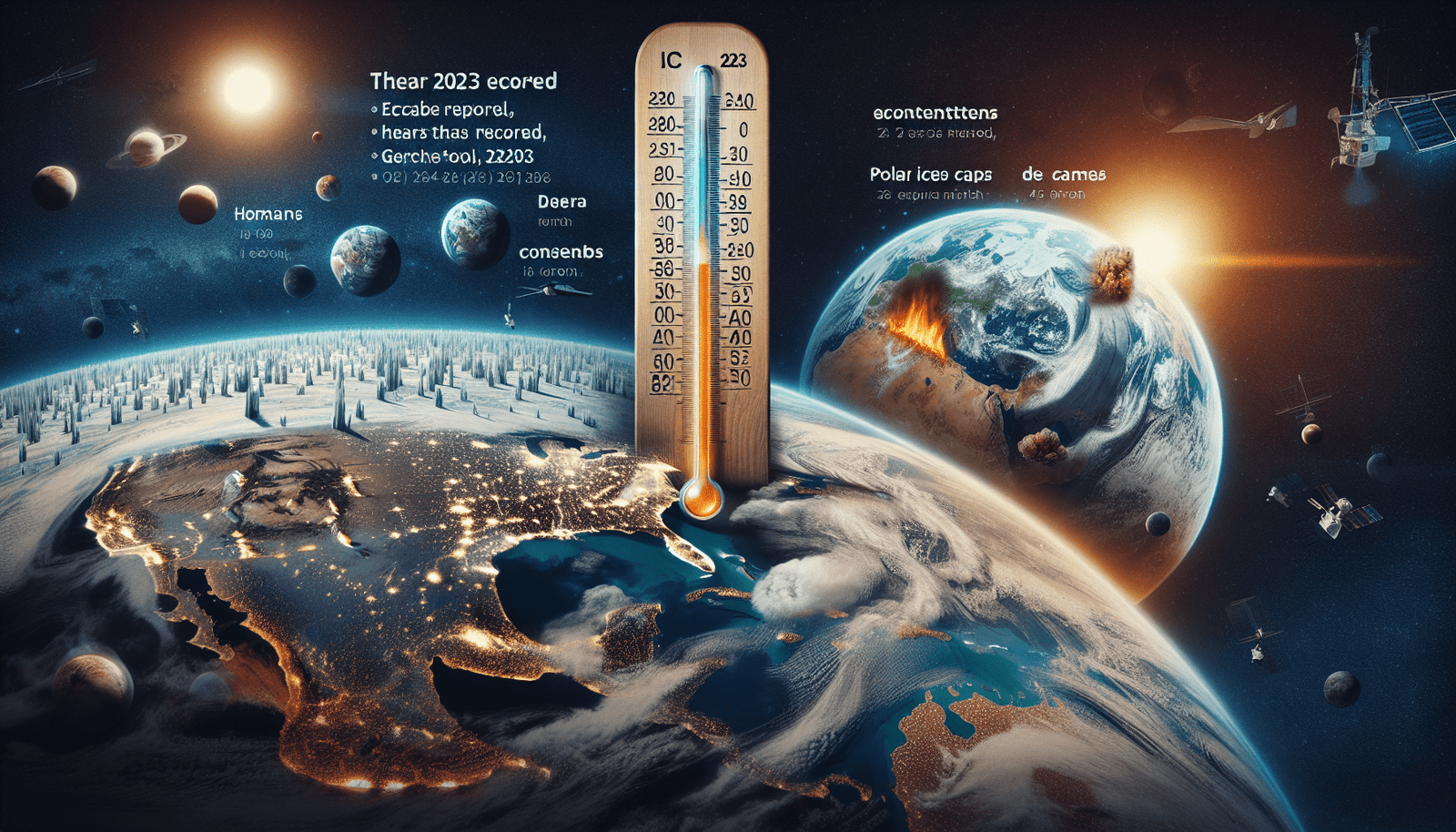NASA has confirmed that 2023 was the hottest year on record. After analyzing temperature data, NASA’s Goddard Institute for Space Studies concluded that global temperatures in 2023 were around 2 degrees Fahrenheit above the average for the baseline period of 1951-1980. This comes as no surprise to those who have experienced droughts, forest fires, and extreme weather events. The impact of climate change is evident in the severe weather patterns that have caused water shortages, massive forest fires, record-breaking heat waves, and devastating floods. While the future may seem daunting, there is still hope as renewable energy use is on the rise and people are demanding action from governments. It is crucial that we take concrete steps to address climate change and its consequences.
Key Takeaways 📝
- 🔥 2023 was the hottest year ever recorded, with global temperatures around 2°F above the 1951-1980 baseline, according to NASA’s analysis.
- 📈 Every month from June to December 2023 broke monthly heat records, with July being the hottest month on record globally.
- 🌎 The severe impacts of climate change were evident worldwide in 2023 through devastating droughts, wildfires, heatwaves, floods, and rising food insecurity.
- ☁️ Human-caused climate change from carbon emissions is the primary driver of the exceptional warming observed in 2023, despite natural climate patterns.
- 🌳 While future warming is predicted for decades, prioritizing renewable energy and implementing mitigation efforts can help reduce the risks of climate change.
NASA Confirms 2023 as Hottest Year on Record
After analyzing the temperature data from 2023, NASA has concluded that it was the hottest year on record. This news may not come as a surprise to those who have experienced droughts, forest fires, or extreme weather events in recent years. NASA’s Goddard Institute for Space Studies (GISS) conducted an analysis using temperature anomalies to determine abnormal heating patterns. Temperature anomalies compare the current temperature to the average temperature over a 30-year period, from 1951 to 1980.
According to NASA’s analysis, every month from June to December 2023 was the hottest month compared to the same months in previous years. In fact, July 2023 was the hottest month ever recorded. Global temperatures in 2023 were approximately 2 degrees Fahrenheit (1.1 degrees Celsius) above NASA’s baseline period. This significant increase in temperature highlights the urgent need to address climate change and its impacts on our planet.

Severe Weather Conditions Worldwide in 2023
The year 2023 was marked by severe weather conditions across the globe, resulting in devastating consequences for both humans and the environment. In the United States, a mega-drought led to water shortages in parts of the Southwest. Reservoirs reached historically low levels, exacerbating the water crisis in these regions.
Meanwhile, Canada experienced massive forest fires that caused extensive damage. These fires, fueled by dry conditions, spread rapidly and enveloped cities in smoke for days on end. Some of these fires, known as “zombie fires,” continue to burn even during the winter season, posing a persistent threat to the affected areas.
Record-breaking heatwaves affected various countries, including India, China, Vietnam, Saudi Arabia, and multiple European nations. In India, temperatures soared above 45 degrees Celsius, resulting in school closures, rolling blackouts, and increased health risks. Saudi Arabia experienced scorching temperatures, with some areas reaching 49 degrees Celsius.
The consequences of these extreme weather events were far-reaching, impacting millions of people. The combination of extreme temperatures, smoke from wildfires, and the destruction of agricultural lands led to alarming health risks, rising food prices, and overall economic instability.

Climate Change and its Impacts
NASA’s analysis attributes the exceptional warming observed in 2023 to human-caused climate change. Heatwaves, intense rainfall, and coastal flooding are among the dire consequences of climate change. While natural phenomena like El Nino and La Nina influence climate patterns, it is primarily carbon emissions that drive climate change.
Carbon emissions from human activities, particularly the burning of fossil fuels, contribute significantly to the increasing global temperatures. Although vegetation and oceans help absorb approximately 50% of these emissions, the remaining amount persists in the atmosphere. The oceans, acting as enormous heat sinks, continue to warm as the atmosphere does. This warming affects the biochemistry of the oceans and accelerates the melting of major ice sheets, leading to rising sea levels.
The impacts of climate change are not limited to temperature changes. Extreme weather events, such as hurricanes and floods, have become more frequent and severe. These events pose significant risks to human lives, infrastructure, and ecosystems. It is crucial to acknowledge the role of human activities in driving climate change and take action to mitigate its adverse effects.

Future Climate Trends
Experts predict that global warming will continue for the next several decades, regardless of current efforts to reduce carbon emissions. However, understanding detailed climate data remains vital for preparing for future impacts and developing effective solutions. It is crucial to gather extensive data to gain insights into climate trends and their potential consequences.
Renewable energy sources play a crucial role in combating climate change. The widespread adoption of renewable energy technologies is essential to reduce reliance on fossil fuels and decrease carbon emissions. Additionally, there is a growing demand for governments worldwide to take urgent action in addressing climate change. This includes implementing policies that support renewable energy development and transitioning to more sustainable practices.
Extreme heat serves as an alarming indicator of climate change, grabbing global attention due to its immediate and tangible impacts. Events such as flooding, wildfires, heatwaves, rising sea levels, and soaring food prices highlight the urgency of mitigating climate change. By recognizing and addressing these warning signs, we can work towards a more sustainable future for all.
In conclusion, NASA’s confirmation that 2023 was the hottest year on record emphasizes the severity of the climate crisis. The occurrence of severe weather conditions, driven by human-caused climate change, has far-reaching consequences for our health, agriculture, and the overall well-being of our planet. While the future may hold further warming, there is still hope. By prioritizing renewable energy, gathering detailed climate data, and implementing proactive measures, we can mitigate the risks associated with climate change and secure a better future for generations to come.

I am the author of this article on NASA confirming 2023 as the hottest year on record. In writing this piece, my aim was to underscore the severity and urgency of the climate crisis we are facing.
The key message I wanted to convey is that climate change is real, it’s happening now, and its impacts are being felt worldwide through devastating weather events. 2023 shattered heat records, and the consequences of this extreme heat were catastrophic – from droughts and wildfires to flooding and food insecurity.
I believe it’s crucial for readers to understand that human activities, primarily the burning of fossil fuels, are the driving force behind this exceptional warming. While natural climate patterns play a role, the data shows our carbon emissions are the primary culprit.
By reading this article, readers will gain insights into the latest climate data from NASA, as well as sobering examples of how climate change manifested in 2023 through severe weather conditions around the globe. I hope this serves as a wake-up call and motivates people to demand action from governments to prioritize renewable energy and implement mitigation efforts.
Ultimately, my goal is to inspire hope that although future warming is predicted, we can still reduce the risks by taking proactive measures now. With detailed climate data, sustainable practices, and a transition to clean energy, we can work towards a better future for all. This article aims to educate and spur meaningful change in how we address this existential threat.
The Universe Episodes
























